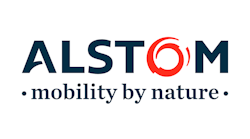Alstom has signed a Head of Agreement with Lagos State Government represented by Lagos Metropolitan Area Transport Authority for both Phase 1 and Phase 2 of the Lagos Blue Line metro. The signature took place at the France-Nigeria Business Forum attended by Mr Emmanuel Macron, President of the French Republic, and His Excellency, Mr Akinwunmi Ambode, Executive Governor Lagos State.
As part of Phase 1, Alstom will ensure the electrification of a portion of the line with third rail as well as substations. After phase 1, Alstom and the Lagos State Government intend to work jointly on Phase 2 of the project by structuring financing from Export Credit Agencies (ECA) to provide metro trains, CBTC based signalling, the operation and control centre, passenger information services and the ticketing system in the stations.
“The Blue Line project is of strategic importance for the city of Lagos as it allows our people to travel safe and fast across longer distances. The integration with existing transport systems like our bus or boat lines, and future metro lines will largely contribute to our global transport plan for Lagos to reduce traffic congestion and make Lagos a smart city,” said Engr. Abiodun Dabiri, managing director, LAMATA.
“Alstom would be proud to participate for the first time with the Lagos local authorities and Lagos Metropolitan Area Transport Authority to the achievement of this important milestone for the city, building on our experience as a global leader in metro projects. Equipped with proven reliable and ecological solutions, the Blue Line will contribute to positioning the city among the showcases of sustainable mobility in Africa,” stated Didier Pfleger, senior vice president Middle East and Africa.
The Blue Line when complete will be composed of a 27km line with 13 stations from Okokomaiko to Marina. The phase 1 and 2 of this line will cover a distance of 12km out of which 4km on viaduct and 5 stations.
This project is the first reference for Alstom in Nigeria. The city of Lagos counts 22 Million inhabitants and is facing severe traffic congestion. Considering the increasing transport demand in the city of Lagos, the Blue Line metro construction aims to address mobility challenges, stimulate economic growth and job creation while improving the environment and air quality of the city. It will carry 400,000 passengers daily with capacity increased to 700,000 passengers daily at completion.



